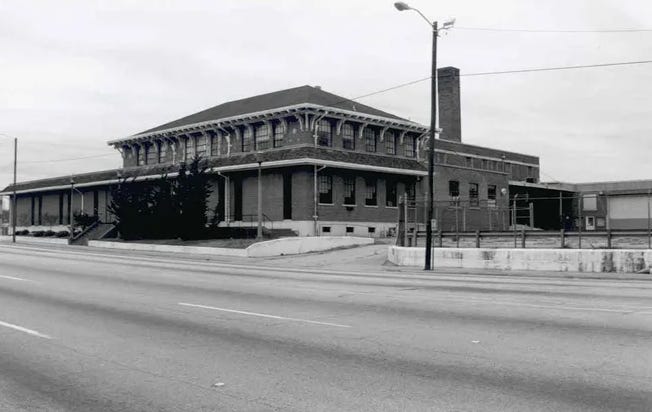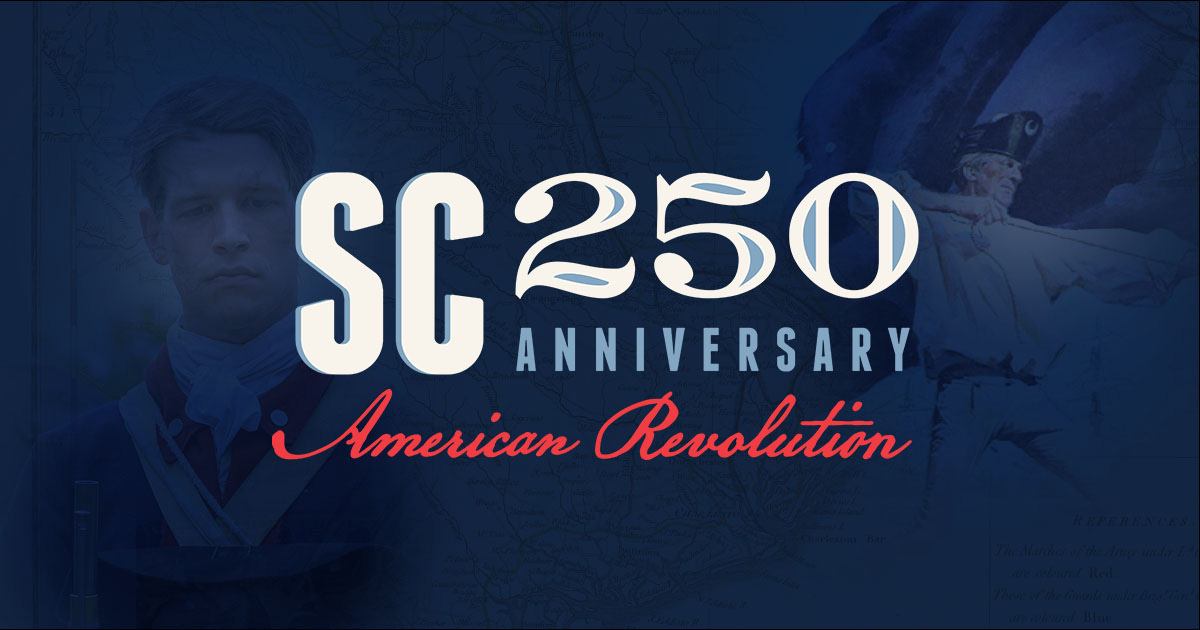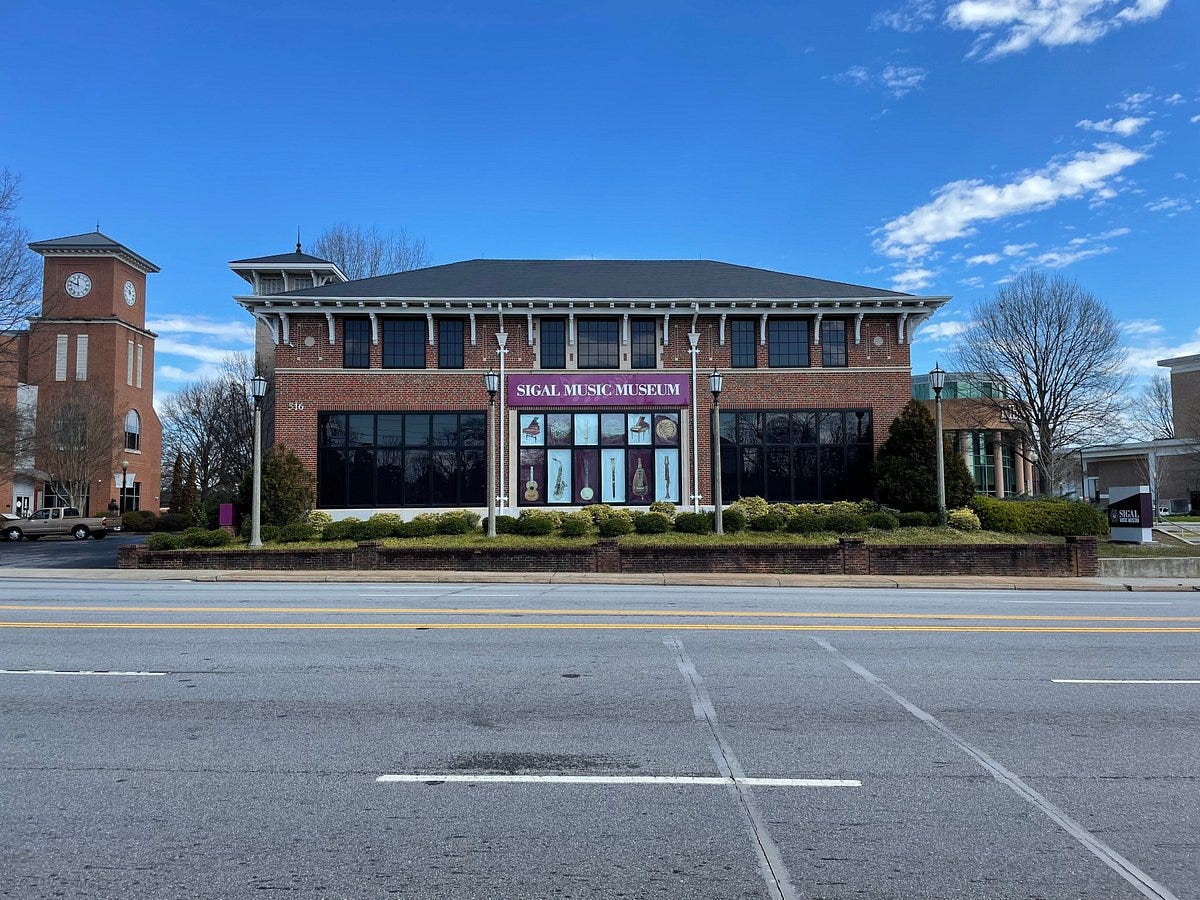#15: Forgotten tapes of Martin Luther King, Jr., a Coke plant with an animal menagerie, and the SC250
For South Carolina history lovers far and wide! Enjoy weekly SC history and upcoming SC historical events
Dear reader,
Welcome to Newsletter #16 of The South Carolina History Newsletter! I’m so happy you’re here.
Welcome “rar2818” “dport475” “taralynn.jones” “windsor.phillip” “mgudridge” “sallylesesne” “msidlick” “mdbomstad” “irishdebs04” and “ladymshealy” to our SC History Newsletter community! Woohoo!
I hope you enjoy today’s newsletter, and as always, please feel free to reply to this email with your ideas and suggestions on South Carolina history you’d like to learn more about. I’m only a click away.
Additionally, please join us & keep the conversation going by becoming a member of our SC History Newsletter Facebook Community here! I can’t wait to meet you.
And now, let’s learn some South Carolina history!
Yours truly,
Kate
(Writing from Greenville, SC)
3 ➳ Upcoming SC History Events
To celebrate Black History Month, each newsletter in February highlights one Black History focused event. The Black History events will be listed first below.
While I have curated the following 3 events below to feature in today’s newsletter, please click here to visit my SC History Events Calendar that organizes all the events I have featured in the newsletter to date, as well as others I have discovered. Please let me know if you’d like to add an event to the list! Reply to this email or send me a note at schistorynewsletter@gmail.com.
I.
BLACK HISTORY MONTH HIGHLIGHT: Thursday, February 29th, 6:00 pm - 7:30 pm | “Afro-Gullah Connection: African Fabrics & Symbols Workshop w/ Donellia Chives” | Coastal Discovery Museum | Hilton Head Island, SC | Tickets: $55 per person (ages 7+)
“Join us as we welcome back Gullah Educator and Cultural Ambassador Donellia Chives to CDM! Donellia joins us for an interactive, histro-educational presentation comprising the history of Ankara fabrics and symbols throughout the African Diaspora. This workshop will showcase various African fabrics, their unique origins, meanings, and significance in Black culture from past to contemporary times and explore their links to present day Gullah culture and heritage. Participants will join Donellia in making a gorgeous Ankara fabric and sweetgrass project that will be theirs to keep.”
II.
Tuesday, February 27th at 6:00 pm | “The Battle of Camden and the Recovered Soldiers with Major Rick Wise, Military Historian, SC Battleground Trust” | First Baptist Church, Charleston or Streaming Online | Charleston, SC | Tickets: $18 for members/$20 for non-members, $10 for livestream
“Rick Wise is a native of Johnsonville, South Carolina, and a graduate of the University of South Carolina. He holds a BA in History, an M.Ed. in Secondary Education (History/Social Studies), and an MA in Military History.
He served over 23 years in the United States Army Field Artillery and is a Veteran of Desert Shield/Storm, Operation Iraqi Freedom from 2005-2006, and is airborne and air assault qualified. He was awarded the Bronze Star with Oak Leaf Cluster.
Rick’s love of military history brought him to the South Carolina Battleground Preservation Trust on the Liberty Trail Project, where he brings diligence and a commitment to historical accuracy that will serve Liberty Trail visitors well. He is also editing the Francis Marion Papers.
Rick and his wife Paula live in Camden, South Carolina and have two adult children and four grandchildren. He grew up hearing stories of the Swamp Fox and his fight for liberty in South Carolina, and is now proud to be able to help others see, hear, and understand the history of the American Revolution across our great state.”
III.
Ongoing! | South Carolina 250 Celebrates America’s Sestercentennial | Click here for list of committees to explore and join!
Note from Kate: While this is not your typical events listing, I have been seeing more and more activity online from the SC250 organizing leadership and have reached out myself to hopefully get involved in Greenville’s SC250 planning. Click here or the link above to see if your county has an organizing committee and see if you can get involved in celebrating America’s 250th birthday, in South Carolina style!
“Want to help celebrate America’s birthday? Get involved with a local County 250 Committee!
Chartered by the SC General Assembly in 2018 … “which shall have the authority and responsibility to plan and execute, insofar as authorized and funded by the General Assembly, a proper observance of the Sestercentennial of the American Revolution in South Carolina, and in cooperation with the South Carolina Battleground Preservation Trust; a national organization, if any; and other similar commemorative organizations in other states. This proper observance of the Sestercentennial must include the role of persons of African-American descent in the Revolutionary War.”
Mission
To celebrate and promote South Carolina’s role in the American Revolution by educating, engaging, and inspiring South Carolinians and visitors.
Strategic Goals
Discover and celebrate South Carolina’s Revolutionary Era, its significant people, places, principles, and events.
Interpret, preserve, and make accessible Revolutionary scholarship and sites.
Educate South Carolinians and the world about South Carolina’s roles in the American Revolution.
Support and promote research and cultural heritage tourism telling South Carolina’s stories from many points of view.
Support and promote local 250th anniversary commemorative events, arts, preservation, heritage tourism infrastructure, and corresponding economic development.
Don't see your county listed and you have a committee? Email info@southcarolina250.com with updated contact info and your county resolution.
Don't see your county listed and you are interested in starting a committee? Email info@southcarolina250.com before getting started as many county groups may be started but don't have an official public contact yet. Then follow the steps on the County 250 page to register your committee.”
2 ➳ SC History Fun Facts
I.
Did you know that Greenville’s Sigal Music Museum used to be a Coca Cola bottling facility (opened in 1930) with state of the art design & equipment — and its sister location at Verner Springs had a lavish garden of goldfish ponds and an animal menagerie?
Ahh the refreshing taste of Coca Cola on a hot summer’s day… Founded in 1886 in Atlanta, Coca Cola began as a fountain drink and was first bottled in 1894. In 1899, separate bottling operations were established and “Greenville [South Carolina] was one of the early franchises.”
The first Greenville cokes “were mixed and bottled in the basement of a Pendleton Street pharmacy.” As the drink’s popularity grew, Coca Cola moved facilities 5 times until a “handsome new bottling plant” was built at 516 Buncombe Street and opened on Monday, November 17th 1930 to much local fanfare, including a week-long open house. It was an “elaborate and expensive” building with a tile roof, ornate brackets and downspouts, and 4 elegant lampposts that “automatically lit from dusk until 11 pm.”
Inside the facility, in addition to the bottling, storage, and refrigeration equipment, there was “a 600-gallon glass-lined syrup tank” on the first floor. The second floor housed the company offices, a directors’ room, and a reception area that was generously open to the public free of charge, and “free Cokes provided at meetings and parties.” In fact, the bottling facility became a true community hub with “community workers, debutantes, senior citizens, Boy & Girl Scouts, Ladies Aid Societies, mill workers, businessmen, and more attending charity and social events” in its reception areas.
At the downtown Coca Cola bottling location, the operation produced 3 million bottles per year. Local historian Judy Bainbridge writes, “The combination of warm summers, an active temperance movement, and churches’ support of Prohibition made soft-drink bottling extremely lucrative.”
In 1931, a second bottling location was built (as a smaller model of the same building) at Verner Springs, “off the Buncombe Road, near Bleachery Road.” Plant president Charles W. Ellis seemed to spare no expense with the landscaping, which featured:
Seven ponds, each featuring different specimens of tropical and hardy waterlilies and hundreds of goldfish, and a menagerie complete with trained squirrels, white rabbits, pigeons, pheasants, and a fox.
A rock garden, carp pond, and carefully tended flower gardens surrounded the spring, which provided pure water for guests and for the ponds as well as for its distinctively flavored Coke. A gazebo sheltered picnics, birthday parties, and community galas held throughout the year.
After reading such a beautiful location of the facility above, I’m sorry to write that the Verner Springs bottling location closed after World War II, and unfortunately in 1961, was burned to the ground, and the “area was abandoned.”
In 1998, Coke manufacturing moved to Mauldin and the other beautiful Coca Cola bottling building downtown changed hands numerous times, and in 2008, was a Bob Jones University sattelite museum and gallery, until 2017 when it became the Carolina Music Museum, which was recently renamed the Sigal Museum Museum. If you have not been to the Sigal Museum Museum, it is a cultural gem of Greenville and a must see if and when you visit town!

II.
Did you know that forgotten audio tapes of Dr. Martin Luther King, Jr. were discovered in a Summerville home on 2012?
Tucked in an old box of keepsakes from her father, Laura Crosby of Summerville, SC uncovered historic gold. She had found tapes in her father’s belongings of Dr. Martin Luther King, Jr. speaking in Charleston in the summer of 1967 (it is the only known recording of the speech), as well as recordings of Reverend Ralph David Abernathy in 1969. Crosby’s father, Eugene B. Sloane, had been a reporter and photographer for The State, a local newspaper in Columbia, South Carolina. Sloan was a “WWII veteran, author, and historian; known by colleagues for his high standards and great integrity.” Click here for the informative news story video of the discovery.
Crosby says that in the found tapes, Martin Luther King warned of a “white backlash,” most likely in reference to a KKK rally which had happened the night before King visited Charleston. Crosby’s father recorded the 1967 KKK rally as well on tape — and this was yet another recording discovered in his belongings by his daughter (and pictured below)! The Merrill C. Berman Collection, an organization that seems to have purchased the tapes and artifacts of Eugene B. Sloane’s journalism career in the years after the discovery, writes on their website:
It is unclear how Sloan was able to record this secret [KKK] rally, but based on the audio’s muffled quality, Sloan’s family believes he may have disguised himself as a Klan member in order to gain access, and perhaps hid the none-too-compact tape recorder and camera under his robes. Scoggin’s [the Grand Dragon’s] toxic speech is filled with racist rhetoric as he calls for violence against King.
In July of 2022, the Merrill C. Berman Collection donated the Eugene B. Sloan Civil Rights Collection to The Avery Research Center for African American History and Culture, College of Charleston, South Carolina. In the press release for this announcement, Merrill Berman wrote, “With its rich holdings of archival materials documenting the unique history and culture of African Americans in Charleston, the South Carolina Lowcountry, and beyond, the Avery Center is an ideal home for this collection.”


1 ➳ Quote from an SC historical figure
I.
“So we suffer from a kind of poverty of the spirit which stands in glaring contrast to our scientific and technological abundance. The problem is, my friends, that we have learned to fly the air like birds and we have learned to swim the seas like fish and yet we haven’t learned to walk the earth like brothers and sisters. But the judgment of God is upon us now. We must all learn to live together as brothers or we will all perish together as fools."
— From the found recording of Dr. Martin Luther King, Jr. from his 1967 speech in Charleston, from the Eugene B. Sloane Civil Rights Collection
Sources used in today’s newsletter:
Greenville history: How the city developed a thirst only Coca-Cola could quench
Donation News: Eugene B. Sloan Civil Rights Collection to the College of Charleston, SC
I always want to improve my work. Answer the poll below to give me your review of today’s newsletter. I also welcome your suggestions for new content! Simply reply to this email with your ideas. Thank you!













